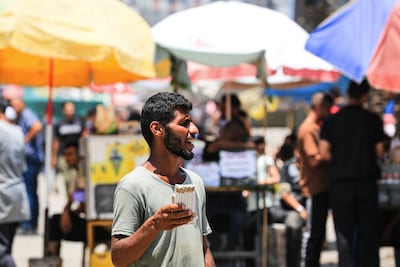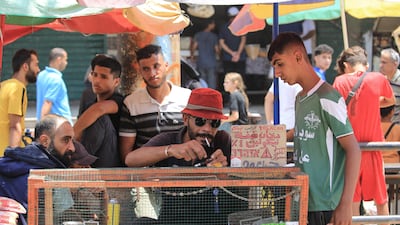Live updates: Follow the latest on Israel-Gaza
Hani Shaheen and three of his friends in war-ravaged Gaza come together to share the cost of a single cigarette, making it a cheaper smoke as the price of tobacco soars.
Since the war began in October, Israeli forces have closed the Gaza Strip's borders, blocking goods, including cigarettes, from reaching the hands of the population of more than two million.
The only tobacco left to smoke is stockpiled by merchants and sold at inflated prices: $30 per cigarette compared to $0.70 before the war.
“Every week, I get together with four of my friends and we each chip in to buy one cigarette," Mr Shaheen told The National.
The desire for a nicotine fix might seem insignificant amid the daily struggle in Gaza, where Israeli fire has killed around 40,000 people in less than a year and shattered the lives, jobs and dreams of many.
But smokers say a cigarette, now seen by many as the "new gold", can help.
"Each of us takes a couple of puffs, just enough to relieve some of the tension and stress we're feeling," explained Mr Shaheen, 24.
"Five puffs don't really do much, but it's become a habit that I can't break, and I'm used to it now, along with many of my friends,” added the young Palestinian who is currently working as a street vendor.
A survey by the Palestinian Central Bureau of Statistics (PCBS) in 2021 found a third of adult men in Gaza were habitual users of tobacco. Rafah governorate in the south recorded the highest smoking rate at 20 per cent, while neighbouring Khan Younis had the lowest at 16 per cent.

Saeb Al Masri, a cigarette trader in northern Gaza, has been working in the cigarette business for 10 years with his sons, operating several shops in the area. He said he has never experienced conditions like these in the business.
“Getting even a single pack of cigarettes has become almost impossible,” he said.
"People used to buy cigarettes freely; some smoked a pack a day, others more, and some half a pack, depending on their needs. Cigarettes were available everywhere and easy to buy.”
Smoking dried tea
Before the war, Gaza had a fairly robust tobacco trade despite restrictions imposed by the Israeli blockade. More than 10,330 lorryloads of goods, including cigarettes, entered Gaza monthly through Israeli and Egyptian-controlled border crossings.
When Israel closed the borders after the attacks on October 7 by Hamas, the Palestinian territory was deprived of goods from outside. For weeks, aid was restricted until it began arriving through the southern Rafah border crossing with Egypt. During this time, some drivers smuggled cigarettes into Gaza.
Israel seized control of the vital Rafah crossing in May and the availability of cigarettes plummeted, disappearing almost entirely from the market.
The cost of a single carton now could be more than $6,000.
“We don't exploit people's suffering; the crisis is caused by the [Israeli] occupation," Mr Al Masri said. "The market operates on supply and demand, and it's natural for prices to skyrocket when supply is very low, especially since some smugglers control the market."
Mohammed Sultan, 26, from the Tawam area of northern Gaza, decided to make things easier for himself by rolling dried tea in cigarette papers and smoking it.
Others have resorted to using dried leaves, especially from guava, and smoking them as a tobacco substitute.
“Honestly, I don't have enough money to buy food, or afford cigarettes at these high prices,” Mr Sultan told The National.
“Smoking tea leaves is very harmful to health. It makes me cough, wheeze and feel short of breath. But unfortunately, there's no other solution."


